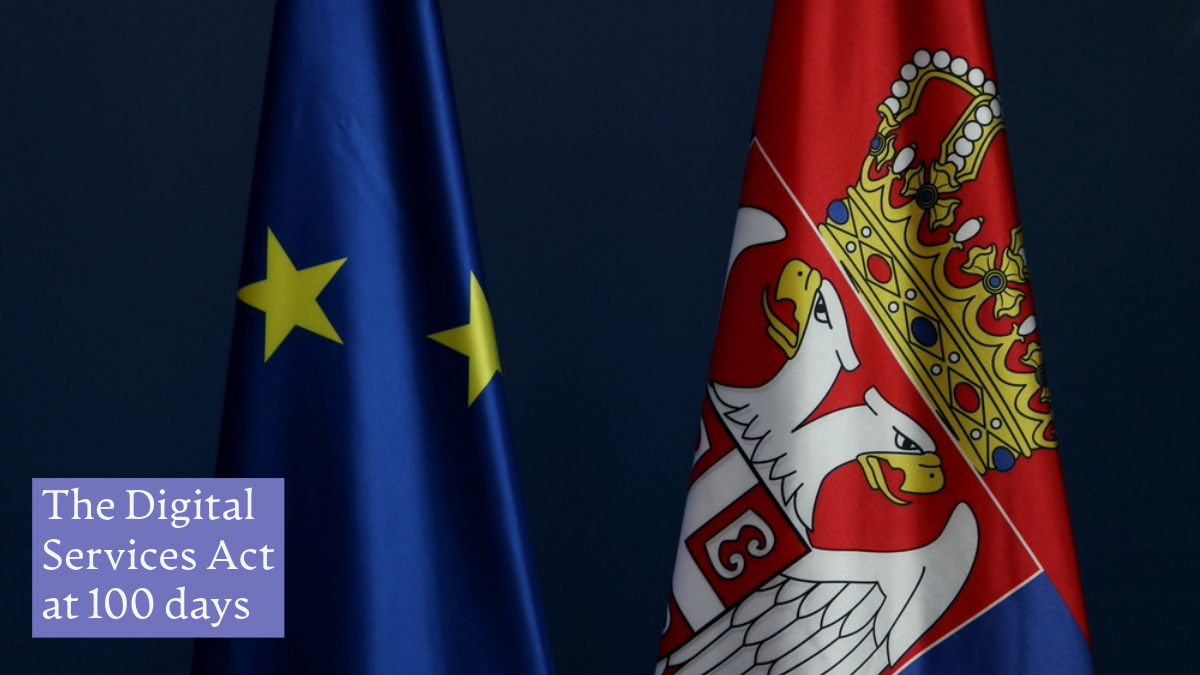Implications of the EU Digital Services Act on Critical Voices in Serbia: Challenges for Civil Society Organizations and Investigative Journalists
Emily Wright / May 30, 2024
The EU and Serbian flags. Shutterstock
Europe’s Digital Services Act (DSA) will have a significant impact on the digital environment, both with the EU and beyond. While the impacts are clearer for EU member states, concerns among civil society organizations (CSOs) about the law's extraterritorial effects are well-founded. Even less clear are the impacts of the law on EU candidate members, who are obligated to align with EU regulations but have received little guidance. The effective implementation of the law rests on the functioning independence of several state-level institutions, including the designated Digital Services Coordinator, which are responsible for the enforcement of the DSA in their own jurisdictions. While this may be possible in several EU member states, this reality may not exist in other states implementing the legislation.
A case in point is Serbia. As a candidate country to the European Union, Serbia is required to implement the DSA as it fulfills its obligation to integrate with EU laws and regulations. However, the issues plaguing Serbia’s political system, which is categorized as a competitive authoritarian state, have resulted in a lack of independence in Serbia’s media regulatory bodies. The impact of the DSA in Serbia hinges on the Digital Services Coordinator's role in implementation and oversight of the regulation and its authority to select trusted flaggers. Due to the likelihood of non-independence, it can safely be assumed that the DSC will align its actions with the goals of the ruling party, the Serbian Progressive Party (SNS). The rhetoric and actions of government-run media, social media bots, official and unofficial statements, and lack of party support for civil society organizations (CSOs) and investigative journalists are representative of the party’s opinion of critical voices in Serbia. Phrases such as “foreign agent," “traitors,” and efforts to convince citizens that these CSOs and journalists are attempting to “destabilize Serbia” are common in government influenced spaces. Although the current situation is difficult, CSOs and investigative journalists have been successful in promoting their work and messaging on social media platforms.
To better understand the challenges these organizations and journalists face, I set out to interview them. After interviewing nine CSOs and investigative journalist outlets based throughout Serbia, I conclude that all rely heavily on social media platforms to promote their work and grow their reach. Several additional conclusions can be drawn from the interviews that are pertinent to questions surrounding the implementation of the DSA and concerns over freedom of expression more generally.
First, both groups have had extremely negative experiences with the Serbian government, the ruling party, and its supporters, ranging from direct threats to property destruction and harassment. This is both a symptom of and an indicator of the country’s current stage in competitive authoritarianism. Not only do officials directly call out CSOs and investigative journalists, but the government's rhetoric continues to incite violence and threats from the public against individuals operating in critical spaces. This adds additional complexity to the already challenging task of operating in a country with little media freedom and an increasingly transparent facade of democracy. Individuals working in these spaces not only have to operate under constant pressure from the government but also must reassure their beneficiaries that their intentions are not aimed at undermining the future of Serbia.
Second, in many organizations, content is already excessively moderated by platforms. Some struggle with verification status; for instance, one investigative journalist outlet said it has faced difficulties obtaining it, one CSO lost it and has been unable to regain it, and another investigative journalist was only able to reobtain their verified status after engaging with an international fact-checking group. This loss of verification status prevents these organizations from using politically charged advertisements to expand their reach.
Finally, according to insights gleaned from my interviews, nearly all organizations aim to target the 'Gen-Z' demographic, typically aged 25–35, primarily through Instagram and TikTok. Instead of relying on traditional media outlets to disseminate their work, due to the lack of available independent media and their limited reach, they prioritize social media platforms to enhance engagement within this age group. Engaging with younger demographics is crucial for these organizations' success, but this success will be hindered if their content is effectively censored. Many of the organizations interviewed remain optimistic that younger generations are more inclined to be actively involved and less influenced by tabloid sensationalism and government narratives. However, without social media free from government influence, the task of reaching this generation becomes insurmountable.
Understanding the interplay among investigative journalists, CSOs, and the Serbian government, alongside the significant possibility of a Digital Services Coordinator that is subservient to the political interests of the government, suggests that the introduction of the DSA in Serbia could have significant negative impacts on CSOs and investigative journalists. While the DSA mandates mechanisms for users to address unjust content removal, platforms may still require considerable time to review content flagged by users as legal or compliant with community guidelines. Existing delays in platform remedies could worsen, posing a particular challenge given the time-sensitive nature of content shared by these organizations.
The situation is especially destructive in Serbia due to the country’s lack of media freedom. Presently, outside of a few independent outlets, critical voices have little to no traditional means to communicate. Social media platforms, currently out of the government's control, provide space for these voices, especially with the younger generation. With the DSA, social media platforms – previously seen as a refuge for critical voices – will be subjected to government influence, impacting not only investigative journalists and CSOs but also citizens, especially in regions of Serbia that lack independent media outlets altogether.
These combined insights from these interviews suggest a grim future for critical voices in Serbia. Nonetheless, Serbian civil society has a strong track record of successfully opposing legislation with severe impacts on human rights. A notable example is the sector's and public’s reaction to the Draft Law on Internal Affairs in 2021, which was ultimately withdrawn by the government due to civil society's efforts. It is crucial that the public, along with civil society, become fully informed about the DSA and its potential consequences. Even though the DSA will have to be implemented for Serbia to continue on its EU path, public awareness and civil society activism will help address and prevent the potential impacts, including the use of the DSA to facilitate the censorship of voices critical of the government. Serbia's extensive and vibrant civil society plays a crucial role in upholding fundamental rights, and its efforts must be actively protected.
Authors
